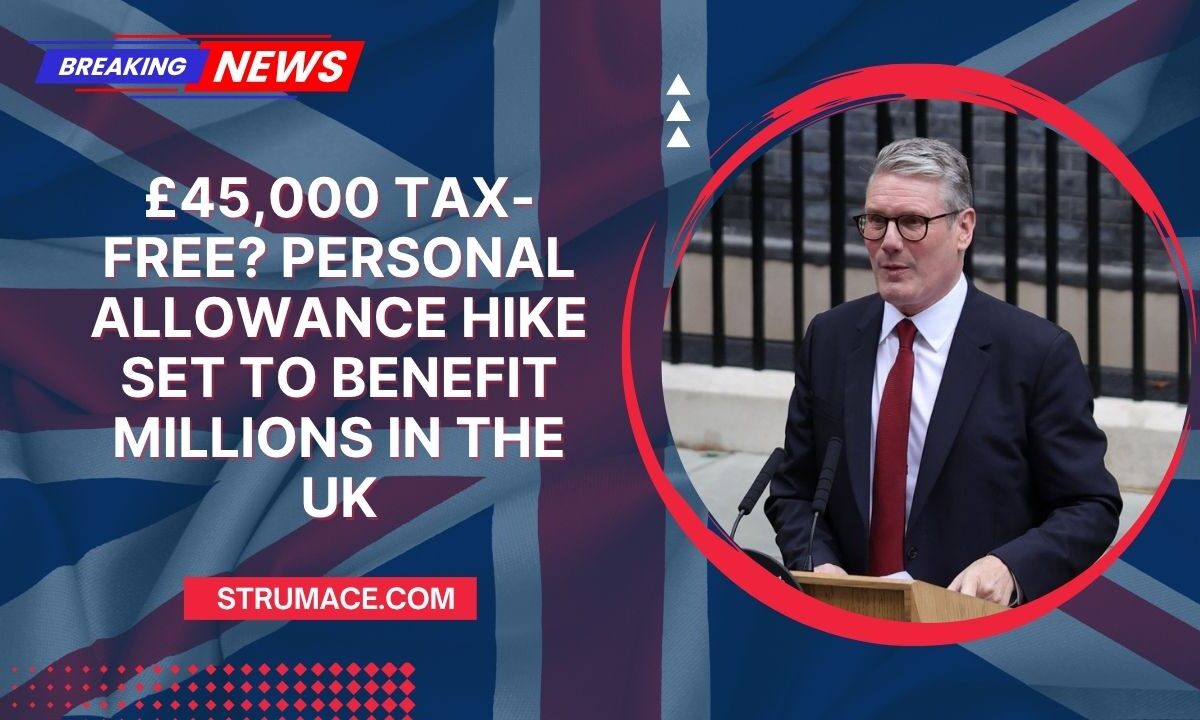With living costs surging and wage growth failing to keep up, a powerful proposal is gaining momentum in the UK.
The suggested reform aims to increase the Personal Allowance—the income you can earn without paying any income tax—from £12,570 to a staggering £45,000. This could provide massive relief for millions of working individuals and families.
If implemented, this would mark one of the most significant tax reforms in recent decades.
Current Personal Allowance in 2025
The Personal Allowance is the portion of income that is not taxed. As of 2025, here is how it breaks down:
| Income Range | Tax Rate |
|---|---|
| Up to £12,570 | 0% (Tax-Free) |
| £12,571 – £50,270 | 20% (Basic Rate) |
| £50,271 – £125,140 | 40% (Higher Rate) |
| Over £125,140 | 45% (Additional Rate) |
This setup means that even modest-income earners are quickly pushed into higher tax bands, even as prices for rent, food, fuel, and utilities soar.
The £45,000 Proposal: What It Means
Raising the Personal Allowance to £45,000 means individuals earning under that amount would pay no income tax at all. For those earning more than £45,000, only the income above this threshold would be taxed.
Key Impacts:
- Zero income tax on earnings up to £45,000
- Higher disposable income for low- and middle-income earners
- Tax savings even for those earning above £45,000
- Boost to work incentives for part-time and full-time workers
This proposal is aimed at reducing the financial strain on average Britons while also stimulating economic activity.
Who Stands to Benefit the Most?
This change could benefit:
- Low-income workers facing financial pressure
- Middle-class households grappling with rising costs
- Graduates and young professionals starting their careers
- Self-employed workers with inconsistent income
- Families managing childcare, rent, and inflation
Even someone earning £60,000 would pay income tax only on £15,000—resulting in thousands of pounds in annual savings.
Why Now? Key Reasons Behind the Push
Supporters argue that the time for bold tax reform is now, due to:
- Rising inflation reducing real income
- Stagnant wage growth across sectors
- More workers pushed into taxation brackets each year
- A desire to incentivize work and reduce benefit dependency
- The need to level the playing field for earners without access to tax breaks
Economic Trade-Offs and Financial Implications
Increasing the Personal Allowance to £45,000 would naturally reduce the amount of tax collected. Some estimate this could cost over £100 billion annually. However, the long-term impact could include:
- Increased consumer spending, boosting business revenues
- Higher VAT collections
- Reduced reliance on government benefits
- Improved job market participation
Still, the government may need to rebalance the budget through spending adjustments or by modifying other taxes.
At a Glance: Proposal Overview
| Aspect | Current (2025) | Proposed Change |
|---|---|---|
| Personal Allowance | £12,570 | £45,000 |
| Tax-Free Earnings Cap | £12,570 | £45,000 |
| Main Beneficiaries | Low-income earners | All earning under £45k |
| Annual Cost to Treasury | — | Over £100 billion |
| Economic Benefit | Minimal | Increased demand & savings |
A New Era of Tax Relief?
Raising the Personal Allowance to £45,000 could redefine how income tax works in the UK. The proposal has the potential to empower workers, increase take-home pay, and stimulate the economy, especially during a time when financial stability feels out of reach for many.
Although implementing such a major change would involve trade-offs and fiscal challenges, its benefits could create a fairer and more equitable tax landscape for years to come.
FAQs
Is the £45,000 Personal Allowance officially confirmed?
No, it’s currently a proposal being considered and debated—not yet law.
Who will gain the most from this change?
Individuals earning under £45,000, who would no longer pay any income tax at all.
Will this affect government services or benefits?
There may be a need to adjust spending or raise other taxes to offset the revenue shortfall.




